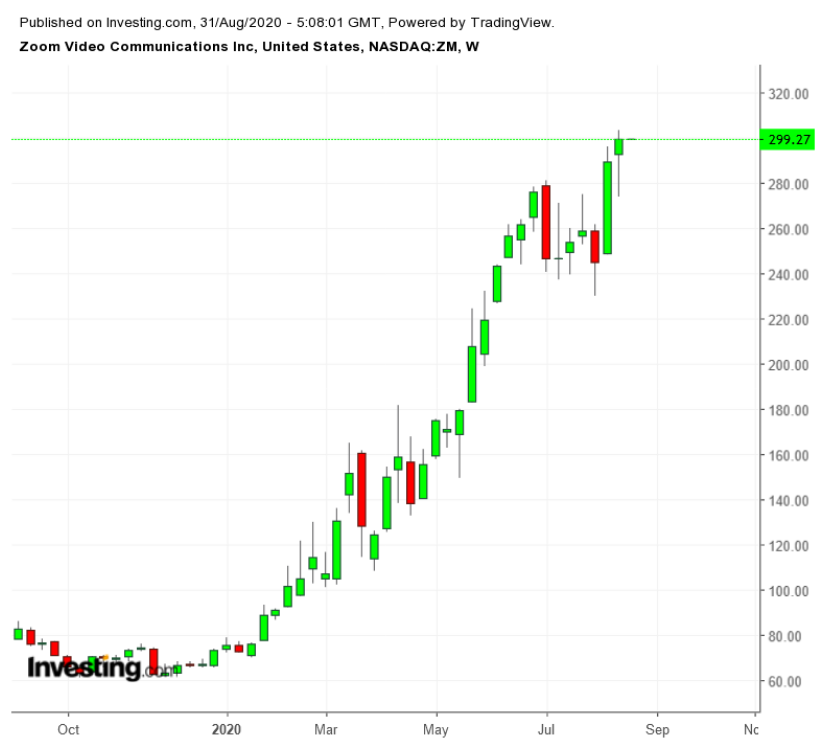- Reports Q2 2020 results on Monday, Aug. 31, after the close
- Revenue expectation: $500.1 million
- EPS expectation: $0.45
Zoom Video Communications (NASDAQ:ZM) is one of the stocks which have benefited immensely from the coronavirus pandemic, as millions of workers and students flocked to digital communications tools after COVID-19 forced countries to lock down their citizens, closing businesses and schools by mandating that populations shelter in place.
Investors will be zeroing in on the company’s second quarter numbers, released later today to find out how quickly this San Jose, California-based company is translating subscriber gains into increased profitability.

The more than 300% rally in Zoom shares this year—which pushed its market capitalization to about $85 billion in just four months—shows that investors have great faith in the company’s management, which is working to make the service a leader in digital communication.
Analysts, on average, expect sales to have surged more than three-fold to $500 million, in the quarter which ended on June 30. Profit should gain to $0.45 a share from just $0.08 a share a year ago. Overall, Zoom expects to generate as much as $1.8 billion this fiscal year, which is almost triple the size of the business in 2019.
The stock’s current valuation indicates that investors expect people will be stuck at home for a long time. And even if the pandemic goes away, it's anticipated more of Zoom’s video conferencing tools will continue to be in regular use.
Network Security Issues
The biggest challenge for Chief Executive Officer Eric Yuan is to make sure his virtual-meeting platform is robust enough to cope with a swell of demand from an array of users ranging from students to corporate executives staying home during the pandemic.
The company’s track record on this front has been mixed so far. Security and privacy issues have hurt Zoom’s credibility from time to time during the past four months.
The Federal Bureau of Investigation’s Boston office in April issued a warning about Zoom, telling users not to make meetings on the site public or share links widely after it received two reports of unidentified individuals invading school sessions, a phenomenon known as “zoombombing.”
At the same time, billionaire Elon Musk’s rocket company SpaceX banned its employees from using the Zoom app, saying it had “significant privacy and security concerns.”
Last Monday, webinars and other online meetings were disrupted or inaccessible. Users couldn’t sign up for paid accounts, upgrade or manage their service on Zoom’s website. The company didn’t disclose the cause of the technical difficulties.
The software maker allows gatherings of as long as 40 minutes for no charge, but the company’s long-term success depends on how many more paid clients it’s attracting. The conversion is important for the company to compete against services from Microsoft (NASDAQ:MSFT), Cisco (NASDAQ:CSCO) and Alphabet's (NASDAQ:GOOGL) Google.
Bottom Line
Even with its impressive gains since April, Zoom still needs to show that it’s getting more paid subscribers and its platform is capable of addressing users’ privacy and security concerns.
That said, Zoom is thriving on the shift to work-from-home which will continue to grow as consumers and companies adopt more digital communication practices in the post-virus world.
